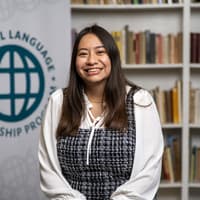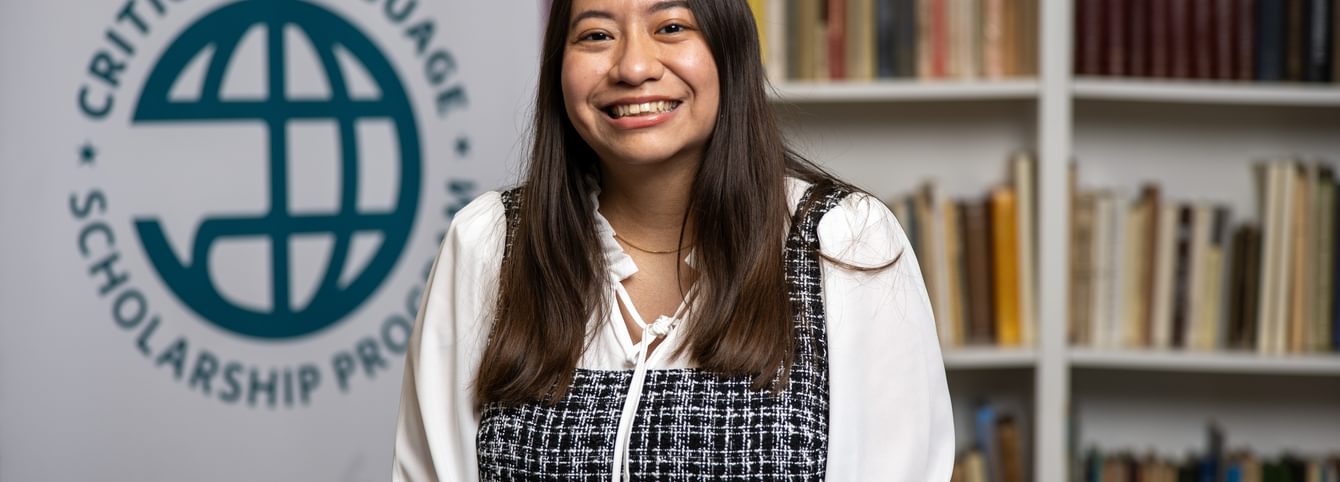Maria Guadalupe (Lupita) Partida
Maria Guadalupe (Lupita) Partida participated in the 2023 CLS Korean Program hosted by Chonnam National University in Gwangju, South Korea. Lupita is a third-year graduate student at the University of Texas at Austin pursuing master's degrees in Global Policy Studies and Information Studies. She currently works for UT Austin’s Benson Latin American Collection as a graduate research assistant. Lupita plans to pursue a career in the federal government working on U.S-ROK cultural and library diplomacy.
Why Korean?
Throughout my childhood, I was immersed in Mexican culture with little exposure to other customs or traditions. When I was 12 years old, I came across Korean television content and became fascinated with their culture, language, and politics. Throughout high school, undergraduate, and graduate studies, I became passionate about conducting research on the country’s political affairs. While living in San Antonio, Texas, I frequently strolled through Denman Estate Park, enjoying its forested grounds and the traditional Korean pavilion by the water stream. A plaque commemorates the pavilion as a gift from San Antonio's sister city, Gwangju, in 2010. As I passed by and observed the plaque, I would imagine myself in Gwangju, a critical site to Korea’s democratic movement. I never imagined I would live in Gwangju for a summer!
A Favorite Phrase in Korean
One of my favorite Korean proverbs is 누워서 떡 먹기 (noowoseo deok meogi), which translates to "lying down while eating rice cakes" and is akin to the expression “it’s a piece of cake.” Although learning a language and adapting to a new environment can be challenging, this phrase inspired me to step out of my comfort zone, engage with locals, and explore unfamiliar local spots.
Why Should Others Learn Korean?
I highly recommend learning Korean to anyone who is interested in deepening their appreciation for linguistics, connecting with other speakers, and stepping out of their comfort zone. The history of the Korean language is marked by linguistic achievements and resiliency. The modern Korean-language system was created in 1443 by King Sejong and features syllable blocks using vowels and consonants. The consonants are designed to represent the shape of the tongue when pronounced. Before the creation of Hangul (the Korean alphabet), Korean was written in Chinese characters (Hanja), which only the elite could read and write. During colonial rule, Korean became outlawed during the 1930s, but it triumphed and is now spoken by over 77 million individuals. Anyone who begins to learn Korean will be introduced to a fascinating and inspiring culture.
Calling a Cab
My cohort, 선생님s (professors), and the lifelong friends that I made in Gwangju (shoutout to Chaewon, Sol, Jiyun, Min Jeong, and Won Young!) made my CLS experience epic and unforgettable. From baseball games, samgyeop-sal and bingsu outings, and cultural excursions, my heart and mind are filled with memories that I will cherish forever. A humorous CLS memory includes the time a cohort friend and I visited Seoul and took a 3-min taxi ride (we did not realize how close it was) to visit Cheonggyecheon. After we got out of the taxi, my friend realized she had left her phone inside the cab. With the help of a nearby policeman, we were able to communicate our problem and get my friend’s phone back.
Sharing my Story
Towards the end of my CLS program, my lovely language partner, Chaewon, invited me for dinner with her mother at a traditional Korean restaurant. Initially, I was nervous to converse in Korean with Chaewon’s mother, but we ended up talking for over 2-hours about my bicultural heritage, my parents’ immigration story, and my life living in a border town. I showed them pictures of my hometown and traditional Mexican candy.
Library Diplomacy
I now study South Korea’s technological innovations in digital literacy within memory institutions, and I plan to complete my graduate thesis in Seoul in 2025 as part of another government-funded fellowship. After completing my thesis, I plan to join the federal government as a civil servant. I hope to integrate my passions for international relations, information technology, and global research librarianship into the profession and become involved in U.S-ROK cultural and library diplomacy.
Words of Advice
Students from various walks of life, disciplines, and backgrounds can greatly benefit from immersive language-learning programs like CLS. As a 12-year-old intrigued by Korean culture and politics, I never imagined I would one day study Korean in Gwangju alongside students from across the U.S. and supported by dedicated teachers and Korean friends. It seemed physically and emotionally impossible to embark on such an opportunity, but now, it feels like eating rice cakes while lying down. Self-doubt and imposter syndrome might deter you from applying, but remember, you are the artist of your life's canvas, capable of turning dreams into realities and adjusting the colors as you go.
Alumni Profiles

Korean 2023
Gwangju, South Korea
Posted Date
September 30, 2024


